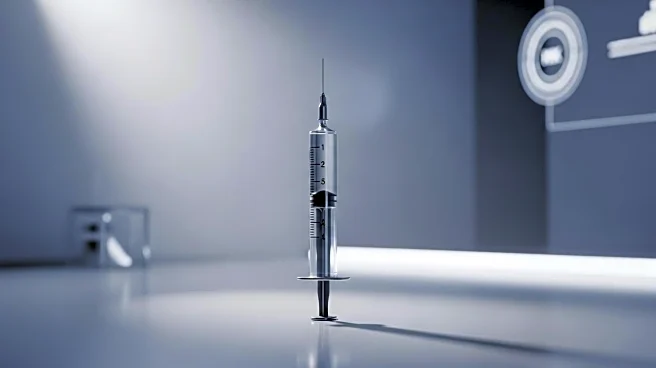What's Happening?
Moderna has announced a significant reduction in its 2025 revenue guidance due to a decline in demand for its RSV and COVID vaccines. The company has adjusted its revenue expectations to between $1.5 billion and $2.2 billion, down from previous estimates. This adjustment comes as the company faces a 41% year-over-year decline in revenue for the second quarter of 2025, primarily driven by reduced sales of its Spikevax COVID vaccine. In response, Moderna has implemented cost-cutting measures aimed at saving $1 billion to maintain financial flexibility. Despite these efforts, the company reported a GAAP net loss of $0.8 billion for the quarter. The company is also focusing on its pipeline of next-generation mRNA products, including a personalized cancer vaccine developed in collaboration with Merck, which is currently in Phase III trials.
Why It's Important?
The reduction in revenue guidance highlights the challenges Moderna faces as it transitions from pandemic-driven revenue streams to a broader mRNA therapeutics portfolio. The company's financial performance is under pressure due to declining demand for COVID-related products, which were once a major revenue driver. This situation underscores the volatility in the biotech sector, where companies must continuously innovate to maintain growth. Moderna's strategic pivot towards next-generation mRNA products, such as cancer vaccines, represents a high-risk, high-reward scenario. Success in these areas could significantly boost the company's long-term prospects, but failure could exacerbate financial challenges. The broader implications for the biotech industry include increased competition and the need for diversification beyond COVID-19 vaccines.
What's Next?
Moderna is expected to focus on advancing its pipeline of mRNA products, with particular emphasis on its personalized cancer vaccine, which could be a game-changer if successful. The company plans to present interim efficacy data from its cancer vaccine trials by late 2025, which could validate its mRNA immunotherapy approach. Additionally, Moderna will continue to navigate regulatory challenges, as recent approvals for its updated COVID boosters have been limited to high-risk groups, potentially affecting near-term sales. The company's financial health will depend on its ability to manage costs and successfully bring new products to market.
Beyond the Headlines
Moderna's situation reflects broader trends in the pharmaceutical industry, where companies are under pressure to innovate while managing costs and regulatory hurdles. The company's focus on mRNA technology positions it at the forefront of a potential shift in how diseases are treated, but it also faces significant competition from other biotech firms like BioNTech and Pfizer. The outcome of Moderna's strategic initiatives could influence investor sentiment and shape the future of mRNA-based therapies.









